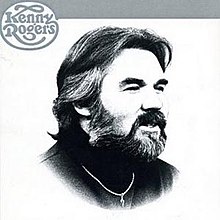Kenny Rogers is the second studio album by American singer Kenny Rogers from United Artists Records, released in 1977. The album marked his first major solo success following the minor success of Love Lifted Me in 1976.
| Kenny Rogers | ||||
|---|---|---|---|---|
 | ||||
| Studio album by | ||||
| Released | January 1977 | |||
| Studio |
| |||
| Length | 35:49 | |||
| Label | United Artists | |||
| Producer | Larry Butler | |||
| Kenny Rogers chronology | ||||
| ||||
| Singles from Kenny Rogers | ||||
| ||||
| Review scores | |
|---|---|
| Source | Rating |
| AllMusic | |
| Record Mirror | |
The album produced two singles. The first single, 1976's "Laura (What He's Got That I Ain't Got?)", peaked at #19. This song was originally a #1 country hit for Leon Ashley in 1967. In 1977, Kenny gained stardom with the single "Lucille", which climbed to the top of the country charts (both in the U.S. and Canada) and placing him squarely on the U.S. Hot 100 in the #5 position. It also blew open his solo career in the UK, reaching #1 there. Another track from the album is "I Wasn't Man Enough" which makes appearances on some of Rogers' greatest hits compilations in years to come.
This was the first of twelve No. 1 albums for Rogers on the Country chart. It ranked as high as #30 overall and was certified Platinum in the U.S. (also reaching Gold in Canada).
Track listing
edit| No. | Title | Writer(s) | Length |
|---|---|---|---|
| 1. | "Laura (What's He Got That I Ain't Got)" | Leon Ashley, Margie Singleton | 2:52 |
| 2. | "I Wasn't Man Enough" | Larry Butler, Roger Bowling | 3:30 |
| 3. | "Mother Country Music" | Joe Nixon | 2:49 |
| 4. | "Why Don't We Go Somewhere and Love" | Kenny O'Dell, Larry Henley | 3:31 |
| 5. | "Green Green Grass of Home" | Curly Putman | 3:35 |
| 6. | "'Til I Get It Right" | Larry Henley, Red Lane | 3:05 |
| 7. | "Lucille" | Bowling, Hal Bynum | 3:42 |
| 8. | "The Son of Hickory Holler's Tramp" | Dallas Frazier | 3:12 |
| 9. | "Lay Down Beside Me" | Don Williams | 3:55 |
| 10. | "Puttin' In Overtime at Home" | Ben Peters | 3:00 |
| 11. | "While I Play the Fiddle" | Ray Willis, Ronnie Sessions | 2:38 |
Personnel
edit- Kenny Rogers – lead vocals
- Bobby Wood, Charles "Chuck" Cochran, George Richey, Hargus "Pig" Robbins, Larry Butler – keyboards
- Shane Keister – Moog synthesizer
- Billy Sanford, Dale Sellers, David Kirby, Fred Carter Jr., Jerry Shook, Jimmy Capps, Johnny Christopher, Pete Wade, Ray Edenton, Reggie Young, Steve Gibson – guitars
- Pete Drake – steel guitar
- Joe Osborn – bass guitar
- Tommy Allsup – six-string bass guitar
- Bob Moore – upright bass
- Buddy Harman, Jerry Carrigan, Kenny Malone – drums, percussion
- Tommy Williams – violin
- Brenton Banks, Byron Bach, Carl Gorodetzky, Gary Vanosdale, George Binkley, Lennie Haight, Marvin Chantry, Pam Sixfin, Roy Christensen, Sheldon Kurland, Stephanie Woolf, Steven Smith – strings
- Bill Justis – string arrangements
- Bergen White, Buzz Cason, Don Gant, Johnny MacRae, The Jordanaires, Larry Keith, Steve Pippin – backing vocals
Production
edit- Producer – Larry Butler
- Engineers – Harold Lee and Billy Sherrill
- Recorded at American Studios and Jack Clement Recording Studios (Nashville, TN).
- Mastered by Bob Sowell at Master Control (Nashville, TN).
- Art Direction – Ria Lewerke
- Photography – David Brandenberg
- Typography – Michael Manoogian
Charts
edit
Weekly chartsedit
|
Year-end chartsedit
|
Certifications
edit| Region | Certification | Certified units/sales |
|---|---|---|
| Canada (Music Canada)[10] | Platinum | 100,000^ |
| United States (RIAA)[11] | Platinum | 1,000,000 |
|
^ Shipments figures based on certification alone. | ||
References
edit- ^ "Kenny Rogers Review by Joe Viglione". AllMusic. Retrieved 26 March 2024.
- ^ Bradman, Tony (30 April 1977). "Albums: Kenny Rogers – Kenny Rogers" (PDF). Record Mirror. London: Spotlight Publications Ltd. p. 22. ISSN 0144-5804. Archived from the original (PDF) on 23 June 2023. Retrieved 7 December 2023 – via World Radio History.
- ^ Kent, David (1993). Australian Chart Book 1970–1992 (Illustrated ed.). St. Ives, N.S.W.: Australian Chart Book. p. 256. ISBN 0-646-11917-6.
- ^ "Top RPM Albums: Issue 3690a". RPM. Library and Archives Canada. Retrieved February 16, 2024.
- ^ "Charts.nz – Kenny Rogers – Kenny Rogers". Hung Medien. Retrieved February 16, 2024.
- ^ "Official Albums Chart Top 100". Official Charts Company. Retrieved February 16, 2024.
- ^ "Kenny Rogers Chart History (Billboard 200)". Billboard. Retrieved February 16, 2024.
- ^ "Kenny Rogers Chart History (Top Country Albums)". Billboard. Retrieved February 16, 2024.
- ^ "Top Country Albums – Year-End 1977". Billboard. Retrieved June 3, 2021.
- ^ "Canadian album certifications – Kenny Rogers – Kenny Rogers". Music Canada.
- ^ "American album certifications – Kenny Rogers – Kenny Rogers". Recording Industry Association of America.